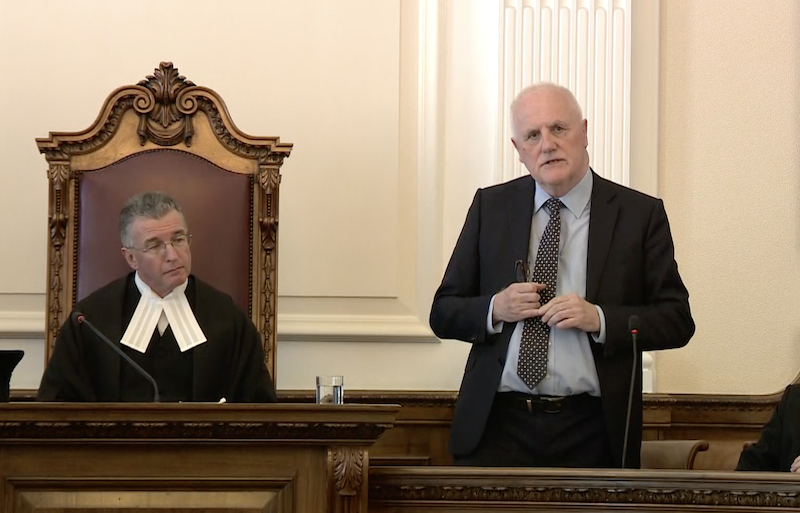


Electronic voting in States' debates will be introduced from June after the Assembly approved proposals from the States' Assembly & Constitution Committee today by 28 votes to nine.
Once the new system is installed, States' members will cast their votes simultaneously using hand-held devices or laptops rather than by calling out 'pour', 'contre' or 'je ne vote pas', as they have for decades, though the oral system will be retained for some minor procedural votes.
Members arguing in favour of electronic voting said that it would provide greater transparency and speed and that it was long overdue, having been debated by the States many times over the past 25 years.
Arguments against electronic voting included a wish to retain the traditional voting methods distinctive to the Bailiwick, concerns about the reliability of the technology proposed and the cost of installing the new system - £109,000 over the next three years - at a time when there is considerable pressure on States' finances.

Pictured: electronic voting is well established in some parliaments, such as in Romania, pictured left, while others - including the British Houses of Parliament, the so-called 'Mother of Parliaments', pictured right - retain more traditional methods of voting.
The debate was opened by Deputy Carl Meerveld, the President of the States' Assembly & Constitution Committee, pictured top.
"We strongly believe that the public has a right to know how members of the States have voted on all substantive propositions in the interests of transparency and accountability. And those decisions and voting records need to be available to the public with immediacy for all substantive votes, which the current system does not provide," said Deputy Meerveld.
"Voting on proposals is arguably members most important function. It is unsatisfactory that the public do not know with votes taken on the shout the way each member voted, who abstained and who was absent. A system of recorded votes on all substantive propositions will provide the transparency and accountability the current system lacks."
Deputy Meerveld said that at present each recorded vote takes the States' small team of parliamentary officials around 15 minutes to process and requires more work than is justified to put the result of votes online. He told the States that electronic voting would save the time of officials.
"The system proposed by the Committee...is innovative, smart and locally developed and supported and value for money. It further digitalises our parliamentary processes to the benefit of members, the public and parliamentary services."

Pictured: Deputy Liam McKenna said the cost of installing electronic voting could not be prioritised or justified at this time.
Deputy Meerveld's Committee was not unanimous in putting forward its proposal with one member, Deputy Liam McKenna, saying that he was impressed by how the proposed system would work but could not vote to spend public money on it at a time of such pressure on the funding of more essential services.
"The electronic voting system is truly brilliant. It is a fantastic piece of engineering," said Deputy McKenna. "I just don't believe this is the time. Today we have £109,000 sitting on the table...and I asked Deputy Al Brouard [President of the Committee for Health & Social Care] what would that get you, and he said two community nurses.
"As most of you know, I work at the hospital. I was walking through the pathology department the other day and I bumped into one of the surgeons and I asked what £109,000 would get you. He said we have a wasting list of over 2,000 for orthopaedic surgery, but for those with cardio-pulmonary disorders or emphysema, who are oxygen dependent, we could send five people to London Bridge and get stents and prolong their lives by maybe 20 to 30 years. For £109,000 we could have five of our mums, dads, grandparents and we could extend their lives today with that money. We could prioritise this money better."
The Committee's Vice-President, Deputy Simon Fairclough, said the States had spent too long debating electronic voting over many years.
"What have the years 2002, 2006, 2011, 2012, 2014, 2018 and 2022 got in common? They're all years in which the States debated simultaneous electronic voting. Over the past 20 years, it's one of those issues which has highlighted yo-yo government at its very best - government at its very worst," said Deputy Fairclough.
"Now we're within touching distance of a solution which will make our Assembly more open, accountable and transparent and there are still those who want to shout 'contre' - that's if they have remembered to turn on their microphones."

Pictured: Deputy Lyndon Trott said he was surprised the proposal had come forward now given the extensive challenges facing public finances.
Former Treasury Leads Deputies Lyndon Trott and Charles Parkinson disagreed about the value of spending £109,000 to introduce electronic voting now.
Deputy Trott said he would vote against because "what government does sets the tone".
"Whether we like it or not, the majority of our community will see this proposal for what it is - an act of incredible self-indulgence," said Deputy Trott. "It isn't essential by any stretch of the imagination. I'm amazed it's in the Government Work Plan. How it could be considered a priority, God only knows."
But Deputy Charles Parkinson, speaking in favour, asked: "When will be the right time?"
"When do we expect to come across these sunny uplands where the States' coffers are overflowing with so much money that we can't think of anything else to spend it on? There will always be other priorities," said Deputy Parkinson.
"If we rank priorities based on questions like 'does someone's life or health depend on it', we will do little more than health. There will never be any time to spend money on culture or any of those less important things.
"Government has a very broad mandate and we have to make progress across a very wide stream of public issues and this is just one. No, it's not the most important thing in the world and nobody's life does depend on it.
"But we have to do things for the right reasons. This is a project which deserves to be supported. It's a simple no-brainer."

Pictured: the system of electronic voting approved by the States today, which they hope will be in place in June this year, will allow members to log into their voting system online and record their votes in debates using hand-held or other portable devices.
The States agreed electronic voting in principle in 2018. Since then, successive States' Assembly & Constitution Committees have investigated the best systems available given the constraints of the Royal Court, where States' meetings are held in the absence of the States having their own Assembly rooms.
Unlike some electronic systems investigated previously, the system agreed today will not require permanent hardware to be installed at each member's place in the Royal Court. It is a web-based system.
"To vote, members will click on ‘pour’, ‘contre’ or ‘je ne vote pas’ on their device," said the Committee in its policy letter.
"The system will then confirm to the member on the screen how they have voted. A member can change their vote up until the vote closes. The system will not display to anyone – including the Greffier or the Presiding Officer – how other members have voted whilst the vote is being held."

Pictured: the Presiding Officer, the Bailiff, left, will still call out the result of the recorded vote once members have cast their votes electronically.
"Once the Presiding Officer directs the Greffier to close the vote, the result of the vote will be displayed on the devices used by the Presiding Officer and Greffier and the Presiding Officer will then declare the result orally to the States’ chamber," continued the Committee.
"The result of the vote and how individual members voted will then be shown on the members’ devices and on the system visible to the general public. The voting results will be sortable by members alphabetically or by how members voted: pour, contre; ne vote pas; absent.
"It will also be available pictorially on the website with a pie chart showing the vote split. The Greffier will be able to immediately publish the result on social media rather than having to manually complete a voting record template and upload this when possible after the vote is taken, as is the case now."
Comments
Comments on this story express the views of the commentator only, not Bailiwick Publishing. We are unable to guarantee the accuracy of any of those comments.